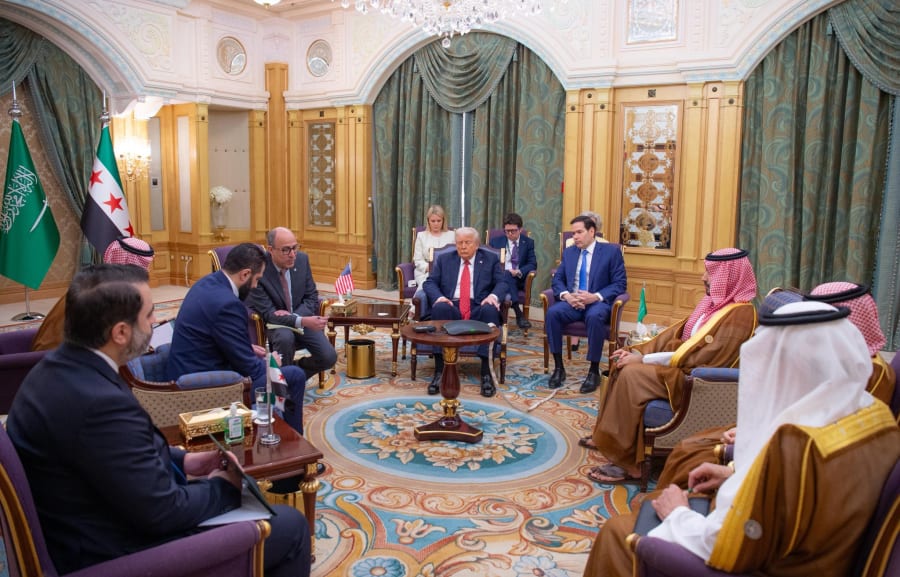An attempt to restore Israeli-Saudi normalization? The Gulf plan to end the Gaza war
Israel says negotiations with Hamas are proceeding ‘under fire,’ include possible ‘end of war’

U.S. President Donald Trump's recent visit to the Middle East may have involved Israel after all – despite his decision not to visit the Jewish state – according to a report in Israel Hayom.
Citing a senior diplomatic source from one of the Arab Gulf states, the Israeli newspaper reported that President Trump discussed plans to end the Gaza War and rebuild the devastated enclave with various leaders. Those discussions included a new ceasefire proposal, the “Gulf plan,” which is roughly based on the Witkoff proposal already accepted by Israel earlier this year.
Despite reports of increasing U.S. pressure during the visit of President Trump to several Gulf states last week, Israel has decided to move forward with Operation Gideon’s Chariots in Gaza in order to increase pressure on Hamas.
The military escalation follows repeated warnings to Hamas that, if it did not agree to a partial hostage deal before the end of President Trump’s visit to the region, the IDF (Israel Defense Forces) would begin the initial stages of its planned ground offensive.
The IDF began increased airstrikes on Hamas positions in Gaza late Friday evening, at the conclusion of Trump’s visit. On Saturday, Hamas announced it would resume ceasefire negotiations with Israel in Qatar, following the intense bombardment in the preceding hours.
According to Qatari newspaper Al-Araby Al-Jadeed, those talks are being conducted based on the Witkoff proposal, but with several changes.
As Prime Minister Benjamin Netanyahu previously stated, the negotiations are being carried out “under fire,” as the IDF has not ceased offensive activities in the Gaza Strip.
It appears that the negotiations could center around the “Gulf proposal” mentioned by Israel Hayom, which calls for a ceasefire to be declared, followed within a few days by the release of half the hostages by Hamas. After that, negotiations to end the war would begin.
During the negotiations, Israel would allow humanitarian aid into Gaza to resume, while Israel and Hamas would engage in a hostage-prisoner exchange, including the remains of dead hostages still being held by Hamas.
Israel would withdraw from the Gaza Strip while Hamas would hand over its weapons to an Arab group, reportedly made up of the Arab states backing the proposal. The leaders of Hamas and other Palestinian terror groups would leave the Gaza Strip for another Middle Eastern country, whose identity was not mentioned in the report.
The plan would see the establishment of temporary tent cities, with field hospitals and the distribution of humanitarian aid, while also working to enable voluntary emigration for any wishing to leave the Gaza Strip, with preference given to the wounded and sick.
After the IDF withdraws and Hamas and other terror groups hand over their weapons, a reconstruction effort – managed by Gulf and U.S. entities – would begin in Gaza. This would include the formation of a governing committee for the Strip, comprising “the United Arab Emirates, Saudi Arabia, Egypt, Jordan, the United States, and a European mission.”
According to Israel Hayom, the proposal also includes two Israeli demands that are supported by the UAE and Saudi Arabia: first, a reform of the Palestinian education system to remove antisemitic and inciting content – similar to reforms already implemented in those two countries; and second, a multi-year program to reform the Palestinian Authority, allowing it to eventually participate in governing Gaza.
The report in Israel Hayom claimed the "PA's involvement is contingent on structural reforms designed to streamline its work and reduce corruption” and is expected to take about ten years.
Israel Hayom also claimed that Hamas has refused two of the basic conditions of the proposal - disarmament for the group and exile for the leaders. The story claims that the leaders of the United Arab Emirates and Saudi Arabia have asked Trump to put pressure on Qatar in order to resolve the issue.
Analysts believe the Gulf proposal is an attempt to rescue the Israel-Saudi Arabia normalization efforts. Despite recent statements critical of Israel by Saudi leadership, reports indicate that Saudi Crown Prince Mohammed Bin Salman is still interested in achieving normalization as part of an effort to bring stability and economic development to the region.
Meanwhile, following Trump’s departure, leaders at an Arab League summit on Saturday called for an immediate ceasefire in Gaza, while rejecting President Trump’s proposal for the U.S. to “take over” the Gaza Strip, which he reiterated while in Qatar on Thursday.
Speaking of Gaza, Trump said, “If it’s necessary, I think I’d be proud to have the United States have it, take it, make it a freedom zone.”
Trump made similar comments in a recent Fox News interview.
Speaking with Fox News’ Brett Baier, Trump said, “Gaza's a nasty place. It's been that way for years. I think it should become a free zone. I call it a freedom zone. It should become a freedom zone.”
When Baier asked whether the Gulf states would be involved in Gaza’s reconstruction, Trump responded, “Well, they would be. They would be. I spoke to all three of them. They would absolutely be,” before stating that “You’ve got to get countries to say, ‘Yes,’ to take them [the Palestinian evacuees].”
Meanwhile, the Prime Minister's Office announced on Sunday that negotiations in Qatar are ongoing, and that one of the proposals on the table is an end to the fighting, the release of all the hostages, the exile of Hamas terrorists and the demilitarization of the Gaza Strip.

The All Israel News Staff is a team of journalists in Israel.
You might also like to read this:
















